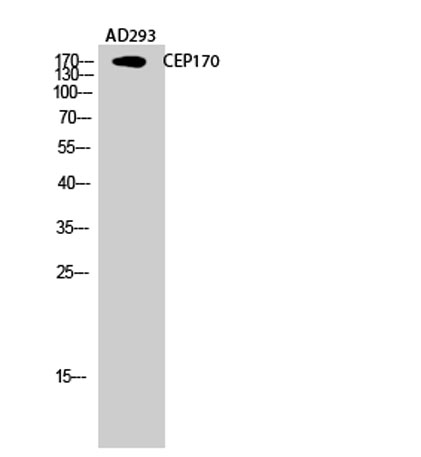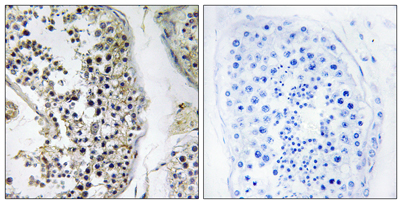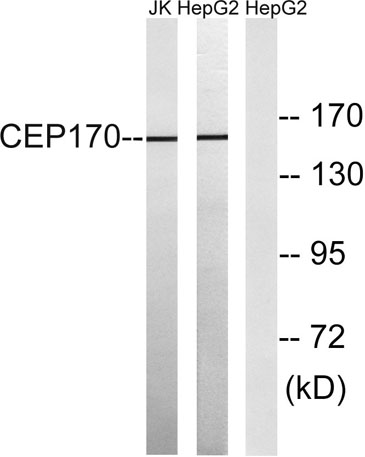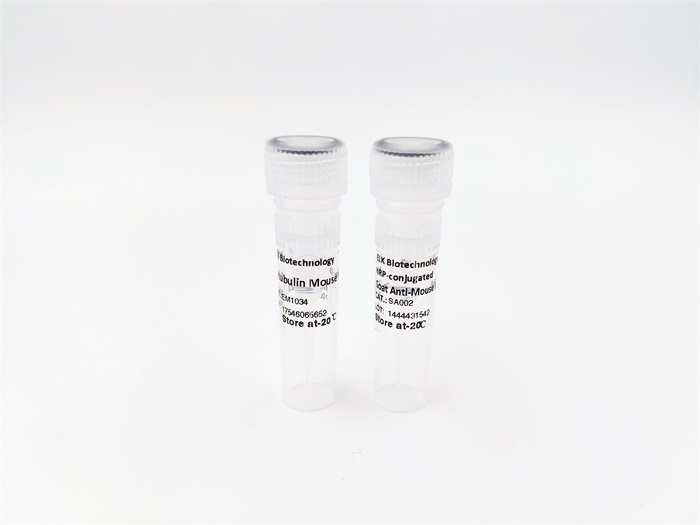









CEP170 rabbit pAb
 One-click to copy product information
One-click to copy product information$148.00/50µL $248.00/100µL
| 50 µL | $148.00 |
| 100 µL | $248.00 |
Overview
| Product name: | CEP170 rabbit pAb |
| Reactivity: | Human;Rat;Mouse; |
| Alternative Names: | CEP170; FAM68A; KAB; KIAA0470; Centrosomal protein of 170 kDa; Cep170; KARP-1-binding protein; KARP1-binding protein |
| Source: | Rabbit |
| Dilutions: | Western Blot: 1/500 - 1/2000. Immunohistochemistry: 1/100 - 1/300. ELISA: 1/40000. Not yet tested in other applications. |
| Immunogen: | The antiserum was produced against synthesized peptide derived from human CEP170. AA range:701-750 |
| Storage: | -20°C/1 year |
| Clonality: | Polyclonal |
| Isotype: | IgG |
| Concentration: | 1 mg/ml |
| Observed Band: | 160kD |
| GeneID: | 9859 |
| Human Swiss-Prot No: | Q5SW79 |
| Cellular localization: | Cytoplasm, cytoskeleton, microtubule organizing center, centrosome . Cytoplasm, cytoskeleton, microtubule organizing center, centrosome, centriole . Cytoplasm, cytoskeleton, spindle . Associated with the mature mother centriole. Associated with spindle microtubules during mitosis. Localizes to the distal appendage region of the centriole (PubMed:31789463). Localizes at the centriole proximal ends (PubMed:31789463). . |
| Background: | centrosomal protein 170(CEP170) Homo sapiens The product of this gene is a component of the centrosome, a non-membraneous organelle that functions as the major microtubule-organizing center in animal cells. During interphase, the encoded protein localizes to the sub-distal appendages of mature centrioles, which are microtubule-based structures thought to help organize centrosomes. During mitosis, the protein associates with spindle microtubules near the centrosomes. The protein interacts with and is phosphorylated by polo-like kinase 1, and functions in maintaining microtubule organization and cell morphology. The human genome contains a putative transcribed pseudogene. Several alternatively spliced transcript variants of this gene have been found, but the full-length nature of some of these variants has not been determined. [provided by RefSeq, Jul 2008], |
-
 Western Blot analysis of various cells using CEP170 Polyclonal Antibody diluted at 1:1000
Western Blot analysis of various cells using CEP170 Polyclonal Antibody diluted at 1:1000 -
 Western Blot analysis of AD293 cells using CEP170 Polyclonal Antibody diluted at 1:1000
Western Blot analysis of AD293 cells using CEP170 Polyclonal Antibody diluted at 1:1000 -
 Immunohistochemistry analysis of paraffin-embedded human testis tissue, using CEP170 Antibody. The picture on the right is blocked with the synthesized peptide.
Immunohistochemistry analysis of paraffin-embedded human testis tissue, using CEP170 Antibody. The picture on the right is blocked with the synthesized peptide. -
 Western blot analysis of lysates from HepG2 and Jurkat cells, using CEP170 Antibody. The lane on the right is blocked with the synthesized peptide.
Western blot analysis of lysates from HepG2 and Jurkat cells, using CEP170 Antibody. The lane on the right is blocked with the synthesized peptide.

 Manual
Manual